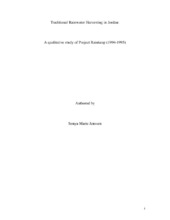Traditional Rainwater Harvesting in Jordan: A qualitative study of Project Rainkeep (1994-1995)
Master thesis
Permanent lenke
https://hdl.handle.net/1956/9863Utgivelsesdato
2006Metadata
Vis full innførselSamlinger
Sammendrag
Ennis-McMillan (2006:129) refers to fresh water as “a resource that countries can no longer take for granted”. An inadequate water supply, commonly referred to as waterscarcity, is the result of a complex, causal relationship between the environment and human water consumption. The interactions between the two can generate water pollution, water scarcity, and unequal water distribution on a global scale (Ennis- McMillan 2006). Jordan has repeatedly been labelled a water-scarce nation (Allan 2001; bint Talal 2004; Faruqui 2001; Gleick 1993; Iskandarani 2001). Strategies to overcome water-scarcity in Jordan have included demand management policies and international aid development projects. This thesis is based on the follow-up study of Project Rainkeep; a small-scale development pilot project intended to be a solution to water-scarcity with the reintroduction of rainwater collection in cisterns for domestic use. The project brought physical enhancements to existing cisterns and encouraged households to once again rely on rainwater collection to support their domestic water budget. The orientation guiding the research has been to ask: Did a development project alleviate suffering from water-scarcity and alter household water-management practices with the re-introduction of rainwater harvesting in village homes in Jordan? In short, the development project did not affect that which it sought to alleviate, in part because waterscarcity was not seen as a problem for households due to a cultural of water-sharing, but there were other positive outcomes for households. In the exploration into the affects of Project Rainkeep, ‘regional political ecology’ has been adopted as the meta-theory. The research has been further broken down into three key areas of investigation: little traditions such as local level water-management, expert knowledge such as the state and Islam, and water-scarcity. Some of the main research questions have been: v 1. How does a household negotiate access to and usage of a necessary but scarce resource? 2. What roles do great traditions of the state, development and Islam play in watermanagement? 3. How does knowledge about water availability affect the practice of watermanagement? Data has been collected qualitatively through the use of semi-structured interviews conducted at the local level from project households and at the national level from watermanagement professionals. In addition, a literature review of key concepts such as local and expert knowledge, state water-management, the role of Islam, globalization and development, and water-scarcity has been conducted. Some of the principal findings have been that coping with water-scarcity at the household level incorporated a threefold strategy to access water publicly, privately and locally through pipes, water trucks and rainwater harvesting. From a cultural perspective, the importance of sharing, generosity and hospitality were values that led to a willingness to distribute water in the villages. In addition, the traditional gap between development aid and the recipients’ perception of that aid existed. While those who worked to implement the project were unsatisfied with the project results and deemed Project Rainkeep a failure those who had their domestic cistern restored expressed gratitude and hope for future aid. It has been difficult to ascertain whether or not Islam played a role in water-management.
